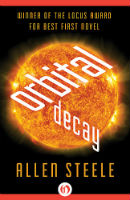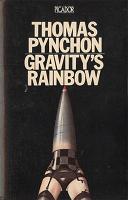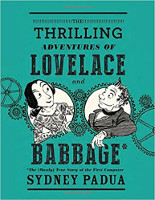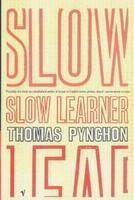 Allen Steele is an American Journalist and SF Writer, his website lists 19 Novels, 3 Novellas, and 5 Collections, which is an impressive list in itself. He also sits on the Board of Advisors for the Space Frontier Foundation and for the SFWA; and he has testified before the Subcommittee on Space and Aeronautics of the U.S. House of Representatives, in hearings regarding space exploration in the 21st century.
Allen Steele is an American Journalist and SF Writer, his website lists 19 Novels, 3 Novellas, and 5 Collections, which is an impressive list in itself. He also sits on the Board of Advisors for the Space Frontier Foundation and for the SFWA; and he has testified before the Subcommittee on Space and Aeronautics of the U.S. House of Representatives, in hearings regarding space exploration in the 21st century.
Allen Steele is the winner of 3 Hugos, amongst other awards; including the Locus Award for Best First Novel which he won for the book at hand, Orbital Decay.
This, his first published novel, is the initial in a series of ebooks by Open Road Integrated Media who are re-publishing his back catalogue in electronic format. Allen Steele's latest book, V-S Day, is out in February 2014.
The story kicks off with Sam Sloane, former Computer Centre manager on Olympus Station and failed SF author, sitting on the moon after having had an accident, and, whilst waiting for death or rescue (the latter being rather unlikely) deciding to dictate the story of how he ended up on the Moon to his tape recorder:
So, to pass the time until my oxygen or suit batteries peter out, I'll tell you a story
The conceit of this being a story told by a (dying) astronaut on the moon, who has just made the greatest discovery ever (and yes, he keeps you hanging on that intro. Just like I do now with you...) is not completely adhered to, though. There are occasional lapses into 3rd person, even for the main story, and sometimes even when Sloane is part of the action... but this is neither a major issue, nor part of the story.
Which plays on Olympus Station, where Sam used to work. Olympus station is a private space station in Low Earth Orbit (LEO), and belongs to Skycorp. The crewmen working on and living on it know it as Skycan, which tells you much of how life on such a station, on a huge construction project (they are building a Powersat, which will end humanity’s energy woes, if you believe the marketing blurb) really is like.
And so we see the Beamjacks, as they are called here, and the day to day tedium of being a construction worker in a hostile and thus highly regimented and controlled environment. And the ways people deal with it, subvert it, break it, or get broken by it.
We also witness loads of internal politics and personal squabbles between staff; which is, sadly, also rather realistic for a load of humans who are cooped up together, doing dangerous, tiring, and boring jobs. No, the future in space definitely ain’t what we were promised!
And so we look over the shoulders of protagonists like Virgin Bruce (ex Biker, on the run from his former gang), Claude 'Popeye' Hooker (ex fisherman on the run from an abusive broken down relationship), amongst others. And, of course, Jack Hamilton, the new Hydroponics engineer (his predecessor left in a straitjacket) who has managed to smuggle a bag of Marijuana seeds with him...
And, lest we forget, we get to know H. G. Wallace, the Station commander. Wallace is an Old Style Astronaut, a National Space Hero, and the proverbial boyscout. And a complete and utter nut case, which Skycorp so far has refused to recall. He is unreasonable in his demands, out of touch with his staff and with the general ambience and social ethics of the station, and suffers from a rather long list of delusions about himself and his work.
Skilfully woven into this background is the main story arc, concerning the phony 'meteorologists' on the station (which everybody knows to be NSA spooks), and what they, or rather their agency gets up to, and what these ‘salt of the earth’ workers do about that.
The world this plays in is clearly, cleverly, and believably derived from ours. We have multiple space stations, some by governments, some part or wholly private, and a worldwide comsat network.
The shuttle has lived up to its premise in this world, and there are weekly ‘milk runs’ into LEO by the fleet of over dozen shuttles, with hugely reduced administrative faff surrounding them and very little technical run-up or prep. Don’t I wish…
Some of the tech has dated hugely since this was written/published (1989) – they have tapes for music (remember those?) and (3D) video. They use tapes for data, too, even for digital data. It all feels very quaint.
There is the odd, rare, technical/scientific muck-up - intersecting geostationary orbits, anyone? or sitting on the moon watching the Earthrise? Again, not that things like these matter to the story, or the reader’s enjoyment thereof.
The story is not told as a straight chronological account, but is instead interspersed with flashbacks and explanations, providing background on both characters and the whole situation and state of the world/universe the story plays in. Some of the human interactions come across a bit stilted and ever so slightly cringeworthy, hard to read and unrealistic. Nothing terrible, though, and all the more so if you keep in mind that this is a first novel. Steele also has a tendency to light foreshadowing, but not enough for it to bother me.
What else can I tell you except to go and get the story, as it’s really rather fun, and a rather poignant reminder of what it might actually mean to live and work in space? Ah, the Grateful Dead. There are lyrics, there are stories about listening to them. You see, Virgin Bruce is a major fan (and I bet so is Allen Steele!).
Oh, and about that greatest discover every made? – actually, no, that would be telling…
Title: Orbital Decay
Author: Allen Steele
Series: Near-Space
Series Number: 1
Reviewer: Markus
Reviewer URL: http://thierstein.net
Publisher: Open Road Integrated Media
Publisher URL: http://www.openroadmedia.com
Publication Date: 2013 (Original 1989)
Review Date: 131123
ISBN: 9781489439924
Price: USD 7.99
Pages: 342
Format: ePub (Nook)
Topic: SF
Topic: Societal
Thanks to the publisher for the review copy.













